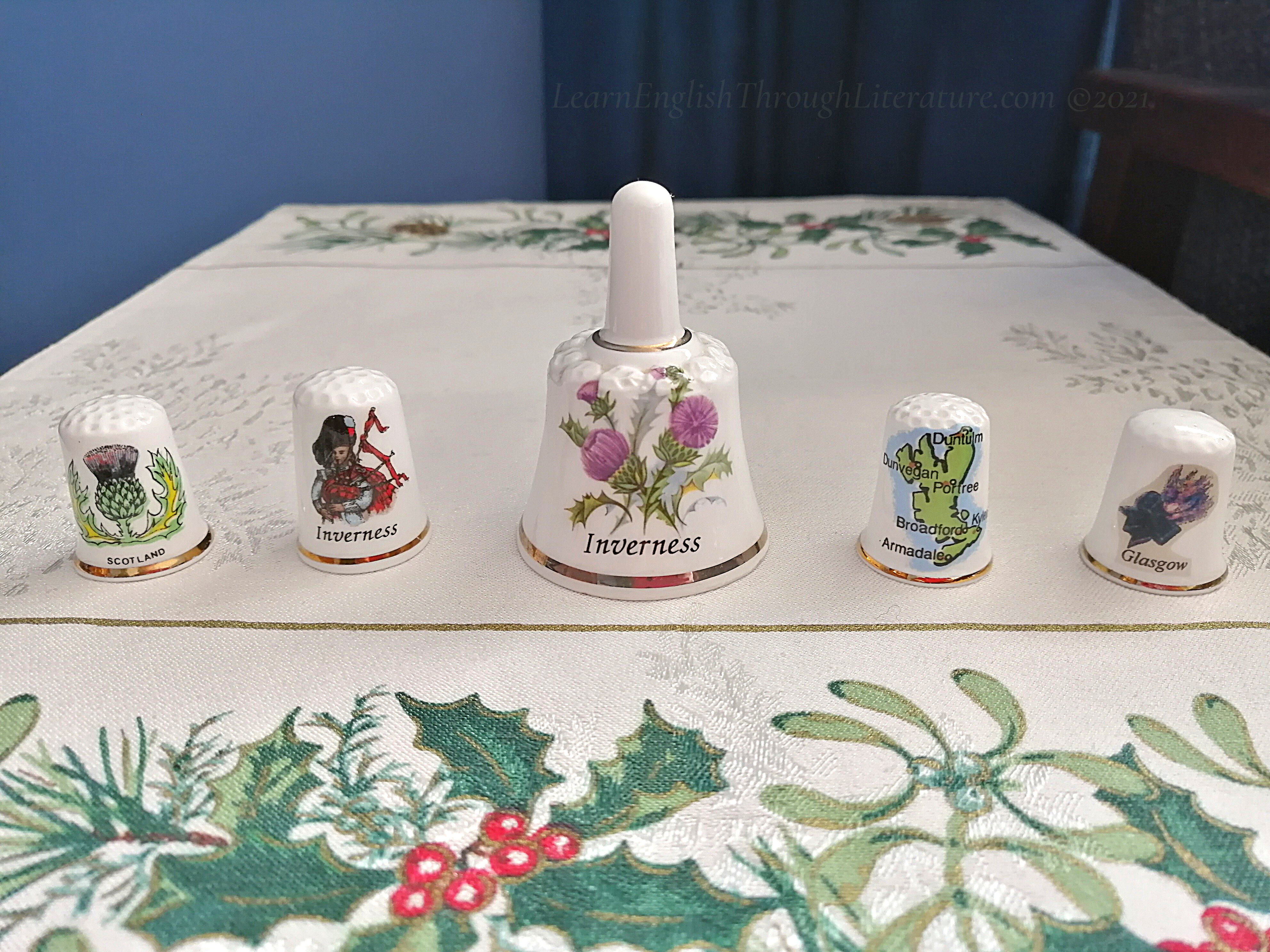Another poet for another Saturday post! As we are drawing close to Robert Burns’ Day, a celebration of Scotland’s poet around January 25th, the time is right to take a look at some of his most famous lines. 🏴
And our family thimbles (small caps to protect the thumb from being pricked by a needle while sewing) from Scotland – bought many years ago, when my father visited the country – are making their appearance to commemorate the season! 🧵
🕯️Robert Burns (1759-1796) is generally seen as the national poet of Scotland, indeed one of its greatest poets, not only for his many poems in English and Scots-language (a dialect spoken in Scotland), but also for collecting many older folk songs from people around Scotland and preserving them in print for generations to come. He helped to influence the Romantic movement in English literature, and has been seen as a beloved cultural icon (symbol) for the Scottish diaspora (communities of emigrants abroad) worldwide.
Like many poets of the 18th-century (1700s), Burns wrote many of his poems in the style of ballads, traditional songs or poems that tell a story through a simple stanza structure. Some of his poems were eventually transformed into songs, such as the one we are looking at today and which, if you have ever been at a New Year’s Eve party in an English speaking country, you are likely to have heard sung before. 🎼
👉 It is a popular song of farewell, commonly sung at midnight on New Year’s Eve as a kind of promise that we will not forget past friends as we head into the new year. But in some places it is also sung at other farewell occasions, such as funerals or graduations. You can find many versions of it online, and one memorable instance of it here at the very end of the classic 1946 movie, It’s a Wonderful Life (a very enjoyable movie in itself, and easy to understand).
Although the song has about five stanzas in total, I am only including here the first stanza and the famous chorus (the part of a song that is repeated after every stanza). As it uses some Scots-language words, you will find explanations of what they mean here below.
…
📜 AULD LANG SYNE by Robert Burns (1788)
Note on the title: This translates as ‘old long since’ (literally), or else something like ‘for the sake of old times’ or ‘long long ago’.
Should old acquaintance be forgot,
And never brought to mind?
Should old acquaintance be forgot,
And auld lang syne!
Chorus:
For auld lang syne, my dear,
For auld lang syne.
We’ll tak a cup o’ kindness yet,
For auld lang syne.
📝 – Whenever you see either ‘old’ or ‘auld’ here, understand that it refers to friends who have been in your life for a long time, rather than a description of their age! ‘Old friends’ simply means ‘friends over many years’.
📝 – The song starts with a question: should [we ever] forget old acquaintances? It is a rhetorical question (a question asked to establish a point or for dramatic effect, instead of an answer), so we know that it is simply saying ‘we should never forget old acquaintances or friends’.
Alternatively, it has been suggested that we can read the ‘should’ at the beginning of stanza 1 as in the conditional tense, which would mean something like ‘in the event that we forget old acquaintances …’ However, I find this kind of reading a bit difficult to accept, because there is no suggestion offered as to what we should do if we were to forget old friends!
📝 – ‘We’ll tak a cup o’ kindness yet’: literally, ‘we’ll take a cup of kindness yet …’. Notice how the Scots-language pronunciation of ‘take’ shapes how it is spelled out here. And the “o'” before ‘kindness’ should be familiar to you at this stage: remember, you find it in the way we write about the time in English, e.g., ‘it is five o’ clock’ – literally, ‘it is five of the clock’.
📝 – ‘For auld lang syne’: ‘for the days gone by’, ‘for the sake of old times’. ‘Syne’ is pronounced the same as ‘sign’, not ‘zine’.
…
🖋️ In searching for more information about ‘Auld Lang Syne’, I came across some information on its background as a poem. Robert Burns is said to have collected (gathered and written down) its lyrics (song words) from an old man who knew an older version of this folk song. Burns transcribed it (wrote a copy of the man’s spoken words) and sent it off to the Scots Musical Museum in 1788, saying, ‘The following song, an old song, of the olden times, and which has never been in print, nor even in manuscript until I took it down from an old man.’ It is almost certain that Burns wrote the other stanzas himself.
Indeed, there was another printed version of a similar song from 1711 from a man called James Watson. If you compare Watson’s published lyrics below with those of Burns’ quoted above, you will notice some strong similarities:
…
📜 (1711 Watson Version)
Should Old Acquaintance be forgot,
and never thought upon;
The flames of Love extinguished,
and fully past and gone:
Is thy sweet Heart now grown so cold,
that loving Breast of thine;
That thou canst never once reflect
On old long syne.
Chorus:
On old long syne my Jo,
On old long syne,
That thou canst never once reflect, On old long syne.
…
🕰️ And so ends our lesson on a very old song that has passed down through many generations from at least 1788, if not 1711, and one that has shaped a whole tradition of leave-taking (leaving, saying goodbye, departure) especially among English-speakers of the British Isles, even to the present day.




